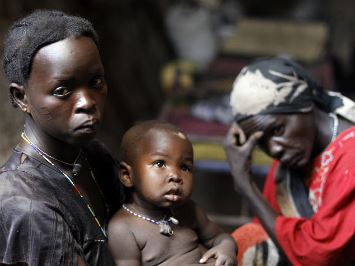SPLM-N warns of humanitarian crisis in Sudan’s Nuba Mountains
July 4, 2014 (KHARTOUM) – The rebel Sudanese People’s Liberation Movement-North (SPLM-N) has warned of a humanitarian crisis in the Nuba Mountains in South Kordofan if assistance was not extended to the displaced population in areas under its control.

The government intensified attacks on the rebels and mobilised a significant number of troops and militiamen as part of its so-called “Decisive Summer” military campaign leading to large displacement of civilians who could no longer seek refuge in South Sudan camps due to the ongoing conflict in the newborn state.
Kumi called upon experts and humanitarian groups to lift the danger of the unexploded ordnance which were dropped by the Sudanese army planes in the SPLM-N held areas during the past months.
He pointed that some of these explosives were dropped into schools and health facilities, warning that lives of thousands of civilians are in danger if the concerned authorities do not intervene.
The SPLM-N official further added that intensive aerial bombardment against civilians which has been continuing since June 2011, led to internal displacement of 700.000 people, saying they are living under very difficult humanitarian conditions.
Kumi praised opposition forces’ stances against the Rapid Support Forces (RSF), underscoring that these militias terrorise the local residences and loot their money besides raping women and children.
He demanded that International Criminal Court (ICC) prosecutor Fatou Bensouda investigate the alleged crimes, calling on rights and humanitarian groups to continue monitoring these violations and exercising pressure on the government.
The rebel governor also called upon Nuba Mountain sons in the Sudanese army, RSF, and Popular Defence Forces (PDF) not to participate in crimes committed by the regime against their innocent people.
The RSF militia was activated and restructured again in August last year under the command of NISS to fight rebel groups in Darfur region, South Kordofan and Blue Nile states following joint attacks by Sudanese Revolutionary Front (SRF) rebels in North and South Kordofan in April 2013.
Earlier this year, the presence of Janjaweed militias incorporated in RSF in North Kordofan state capital of El-Obeid drew widespread condemnation from residents who accused it of spreading terror.
These forces were blamed at the time for looting commercial markets and killing of a merchant in El-Obeid leading to massive protests across the city.
The governor of North Kordofan state, Ahmed Haroun, announced afterwards that his government made the necessary arrangements to drive them out from the state within 72 hours. The RSF has denied any wrongdoing.
Sudanese authorities arrested the leaders of two opposition parties recently after accusing the RSF of committing serious abuses in conflict zones.
Kumi accused members of the government’s negotiation team from the Nuba Mountains, including Danial Kodi, Bako Tali Rimboy, Mohamed Murkazo Koko, Muneer Shiekh Al-Dian, Bishara Guma’a Aru, and Abdel-Bagi Garfa, of “being bribed” by the government in order to prevent achieving a comprehensive and just solution for the problem in the area.
The border states of South Kordofan and Blue Nile state have been the scene of violent conflict since June 2011 when the SPLM-N launched an insurgency against the Khartoum regime.
Peace talks between the two parties remain deadlocked after they failed to reach a common ground for negotiations. While the government says it is only willing to discuss the conflict in the Two Areas, the SPLM-N is demanding a comprehensive peace process.
(ST)
